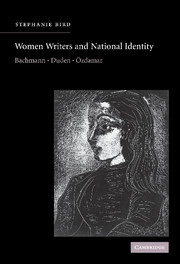Book contents
- Frontmatter
- Contents
- Acknowledgements
- Introduction
- PART I INGEBORG BACHMANN: THE TODESARTEN PROSE
- PART II ANNE DUDEN: THE SUFFERING BODY
- 4 The short stories. Thoughts on the body and ethics
- 5 Desire and complicity in Das Judasschaf
- PART III EMINE ÖZDAMAR: PERFORMANCE AND METAPHOR
- Conclusion: das war es
- Notes
- Bibliography
- Index
4 - The short stories. Thoughts on the body and ethics
Published online by Cambridge University Press: 22 September 2009
- Frontmatter
- Contents
- Acknowledgements
- Introduction
- PART I INGEBORG BACHMANN: THE TODESARTEN PROSE
- PART II ANNE DUDEN: THE SUFFERING BODY
- 4 The short stories. Thoughts on the body and ethics
- 5 Desire and complicity in Das Judasschaf
- PART III EMINE ÖZDAMAR: PERFORMANCE AND METAPHOR
- Conclusion: das war es
- Notes
- Bibliography
- Index
Summary
Anne Duden is a writer who has received considerable positive attention from critics interested in women's writing. A writer of short stories, essays, a novel and poetry, she explores the complex interaction of female identity, the body and national identity. She confronts, indeed emphasizes, aspects that are often ignored or repressed: despair, horror, violence and death. As in Malina, the female narrators in her work depict themselves as the suffering victims of a violent society, and their sensitivity to repressed atrocities, to the horror underlying daily existence, is identified as belonging to a feminine economy. The constant presence of violence in the texts and the resulting despair of the narrators seems to invite feminist interpretations which implicitly accept the female subject as a victim; the violence is an external ill inflicted upon her. It is this relationship of violence to victimhood which I shall scrutinize in the following chapters. In this first chapter on Duden I concentrate on the short stories in the volumes Übergang and Wimpertier and discuss the implications of the figure of the suffering female victim for the concept of a feminist ethics. Whereas there is little in the stories that invites exploration of how female and national identity interact, with the exception of ‘Übergang’, Das Judasschaf develops the stories' representation of femininity in explicit relation to Germanness.
- Type
- Chapter
- Information
- Women Writers and National IdentityBachmann, Duden, Özdamar, pp. 95 - 123Publisher: Cambridge University PressPrint publication year: 2003



